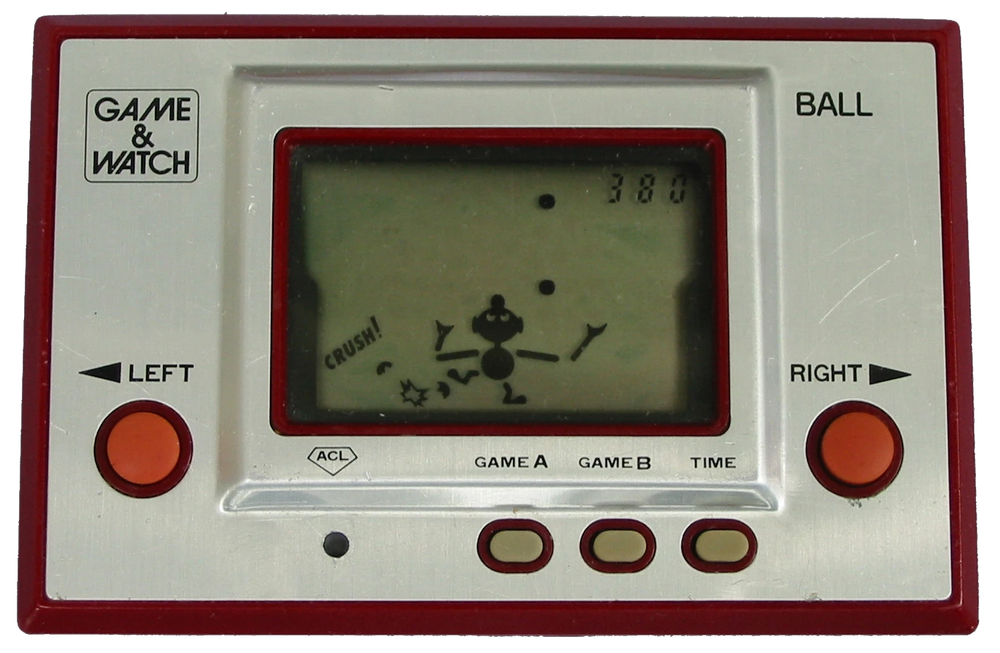
Back when Nintendo was in its early days of video game making, Gunpei Yokoi saw a businessman playing with his LCD calculator while commuting. This inspired him to make a watch that doubled as a game to kill time with. Thus the Game & Watch, a smallnote , portable, single-game console that could also tell the time, was born. This was a huge innovation, and the product sold well despite its games being simple even by '80s standards. It was Nintendo's first major video game success, as well as its first product to gain much attention outside Japan.
Dozens of different models were produced, with later series trying concepts such as a DS-like clamshell ("Game & Watch Multi Screen") or two attached controllers for multiplayer games ("Game & Watch Micro Vs.") The Game & Watch sold ~43 million units, helped popularize handheld video games, started Nintendo's near-monopoly on handhelds, and contributed to Yokoi's ascent within Nintendo, where he would be instrumental to many well-known projects.
Some games were remade into the Game & Watch Gallery series for Nintendo Game Boy, and there have been further ports to various Nintendo products as well.
Some of the popular Game & Watch games:
- Ball (1980): The very first game. The player has to juggle a number of balls in the air. Re-released in Game & Watch Gallery 2, Game Boy Camera, and on DSiWare, and was a reward offered through Club Nintendo.
- Flagman (1980): The player mimics a sailor, who holds numbered flags. Appears in Gallery 3, as a mini-game in Wario Land II and as DSiWare.
- Fire (1980): Perhaps the most popular game in the series, and the basis for Mr. Game & Watch's Smash Bros. design. Two firemen must bounce people from a burning building to an ambulance. Appears in Gallery 1, 3, and 4.
- Octopus (1981): Three divers go under the sea to salvage treasure. A large octopus guards it. Appears in Gallery 1 and 4, and part of Club Nintendo's Game & Watch collection.
- Egg (1981) (Later re-released as Mickey Mouse): Playing as a hungry fox, the player collects eggs from hens. Appears in Gallery 3. The original game saw a rare re-release with Mickey Mouse in place of the fox, as a tie-in game. This game was later ported in the Soviet Union as a tie-in to the popular Soviet cartoon series Nu, Pogodi!.
- Helmet (1981): A simple Point A to Point B game, where the player must dodge falling tools. Playable in Gallery 2 and as DSiWare.
- Lion (1981) Two men must keep wild lions inside a cage. Appears in Gallery 3.
- Manhole (1981): The player must fill in the holes in a bridge to keep travelers safe. Appears in Gallery 1 and 4, also as DSiWare.
- Chef (1981): As a busy chef, the player must avoid dropping various foods. Playable in Gallery 2 and 4, where Princess Peach is the chef. Downloadable through DSiWare.
- Popeye (1981): As Popeye, catch objects thrown to his boat from Olive Oil while avoiding strikes from Bluto.
- Donkey Kong (1982): Practically the same as the arcade game. Playable in Gallery 2 and 4. The D-Pad was created especially for this game, and would be used in virtually every game system, Game & Watch and otherwise, thereafter.
- Donkey Kong Jr. (1982): Partially the same as the arcade version. Appears in Game & Watch Gallery 3 and 4.
- Greenhouse (1982): Playing as a gardener, the player guards precious flowers from insects. Appears in Gallery 3.
- Oil Panic (1982): A boss and employee of a gas station must keep an oil leak under control. Appears in Gallery 1.
- Turtle Bridge (1982) The player must deliver a package from one side to the other, across a bridge of hungry turtles. Appears in Gallery 3.
- Mario Bros. (1983): Very different from the arcade game of the same name. Mario and Luigi* are in charge of a bottling factory, and must get the cases of bottles through the factory belts safely. Playable in Gallery 3 and 4, where the bottles are replaced with cakes.
- Boxing (1984) (Later renamed to Punch-Out!!): Similar to Urban Champion. Also available in Game & Watch Gallery 4.
- Super Mario Bros. (1986): A condensed version of the NES game. Introduced the Auto-Scrolling Level to Mario, which would be embraced by future games in the main series. An Updated Re-release in 1988 would feature improved artwork, with Mario resembling his official character design rather than the original's more generic "Mr. Game & Watch" with a cap and mustache.
- Zelda (1989): Another condensed version of an NES game; the only Game & Watch title featuring Link, a definite ending and the ability to continue should the game be over as a result of the player character's death. Appears as the final game in Gallery 4.
- Mario the Juggler (1991): The very last game. A remake of Ball featuring Mario.
When the Game & Watch celebrated 40 years in 2020, the same year Super Mario Bros. celebrated 35 years, a new Game & Watch system was released which contained Super Mario Bros., and Super Mario Bros.: The Lost Levels as well as a special version of Ball starring Mario. One year later, another new Game & Watch would release for the 35th anniversary of The Legend of Zelda which was bundled with The Legend of Zelda, Zelda II: The Adventure of Link, the original Game Boy version of The Legend of Zelda: Link's Awakening, and a special version of Vermin starring Link.
For information about the series' gameplay, go here. The Game & Watch Gallery video games have their own trope page.
